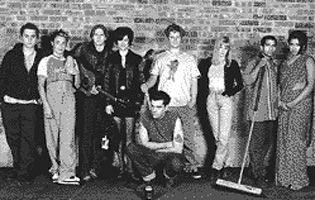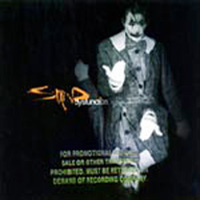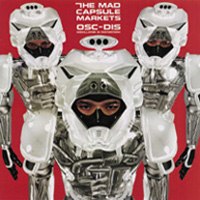 Richard Linklater
Richard Linklater
An interview with Richard Linklater
by William Ham
Since much of the most decisive action in subUrbia takes place offscreen in the suite at the Four Seasons Hotel where Pony is staying, it seemed most appropriate that my meeting with Richard Linklater would take place at the Boston branch of the same hotel, albeit in a room no larger than my kitchen. Linklater has every right to such relative opulence – he is arguably the member of Indiewood’s young cabal with the best track record. Each of his four pictures (Slacker [1991], Dazed and Confused [1993], Before Sunrise [1995], and subUrbia) is a modest masterwork of observation, affection, and lots of sharp dialogue. Though often pegged as a Gen-X Robert Altman for his elliptical, rambling approach, the Austin, Texas native sidesteps the jaundice that has infected the older director’s work, and is as friendly and unprepossessing in person as his films. Observe.
 I can see where your and Eric’s sensibilities converge, but of course his world view seems so much darker than yours. Was it a conscious decision to go darker with this film?
I can see where your and Eric’s sensibilities converge, but of course his world view seems so much darker than yours. Was it a conscious decision to go darker with this film?
I think ultimately the film’s less dark than the play. I definitely have that side to me, and it shows up here and there in some of my other films, not in the overall subject so much, but it’s there in Dazed and in Slacker particularly if you look around for it. But that was what drew me to Eric’s stuff, it’s much more dramatic, much more confrontational. He tends to play things very big, with actors chewing up the scenery and so on, those are the kinds of characters he loves. And I tend to be just the opposite, the sort of loose, nothing’s-a-big-deal sort of thing in a lot of my characters so we sort of met in the middle. For me, the challenge was to make it work dramatically, the whole last part where it’s sort of spinning, boiling over – it’s really like nothing I’ve done before, yet not so big a step I was totally out of my depth. I’m not that confident that I could just say “Oh yeah, I’m gonna do this big action/adventure film now.” I’m not the right guy. I’m a slave to my own personality, for better and worse.
 But this is different. It’s certainly my longest film, a good twenty minutes longer than any of my others, but the trajectory of it is so much faster. A lot of that is plot and narrative. I learned a lot from Eric from doing this film in terms of narrative structure. With my other films, I could cut out scenes without it damaging the overall picture too much. Here, I had to be more careful about that.
But this is different. It’s certainly my longest film, a good twenty minutes longer than any of my others, but the trajectory of it is so much faster. A lot of that is plot and narrative. I learned a lot from Eric from doing this film in terms of narrative structure. With my other films, I could cut out scenes without it damaging the overall picture too much. Here, I had to be more careful about that.
Speaking of time, this is your fourth consecutive film that takes place within a 24 hour time frame.
They’re getting shorter, though! It’s just sort of turned out that way, though there must be some aspect of me that just likes carving out that niche of time. You can take any story and just single out one night, one day… what you see there will imply a lot, it’ll tell you a bigger story, it won’t be on the screen, but it’s there.
 What were the films or filmmakers that made you wanna jump up and start directing?
What were the films or filmmakers that made you wanna jump up and start directing?
There are two levels to that. First there are the films that make you fall in love with cinema, but those usually aren’t the films you can make, and then there are the low-budget films that someone did in their backyard that make you think “Hey, I could do something like that.” Stuff like Chan Is Missing, Last Night at the Alamo, Return of the Seacaucus Seven, Stranger Than Paradise… they may not be the best films, they might not make my top 100, but they’re very motivational in that way. I was glad to see that Slacker kind of shaped up to be a film like that. They’re the kind of films that make it look easy, then you see the big epics and go “Okay… I can’t do that.” Then you see something like Clerks, it’s very crude and raw and you think “Shit, I could buy a camera and just roll it and it wouldn’t look much worse than that!” (laughs)
You were very funny in the first scene in Slacker, but you haven’t really appeared in any of your other films, have you?
Oh, sure I have. I cut myself out of Dazed. I played this sleazy guy with big sideburns pulling up to a corner in a Cadillac, dropping a young girl off and driving away, which was a fun part, but it wasn’t necessary. In Before Sunrise, I’m playing foosball in the background in one scene, and I’m in subUrbia for about 36 frames. When Pony’s signing the CD for those kids, look carefully. I’m one of the guys in the band on the album cover. So yeah, I’m diminishing my presence with each film. In the next one I’ll probably be subliminal! But I like acting, though. If someone I know calls me up and says “I’ve got a role that’d be perfect for you!,” I’d trust his judgment. As a matter of fact, I’m in the Beavis and Butthead movie. I play the bus driver who gets into a fight with Beavis and throws him off the bus, but I did that because Mike Judge is an old friend of mine from Texas.
 You seem to understand the settings of your films on a very personal level.
You seem to understand the settings of your films on a very personal level.
All my films are personal, Dazed and subUrbia especially, coming as I did from a shitty little town in West Texas. I mean I never met a French girl on a train in Germany or anything, but I still brought my own experiences to that. You have to. My next film (The Hudson Boys) is a twenties period piece, but I’m gonna find my own way into that story as well. That’s the magic of movies, the whole “How would I react if…?” part of it. But one of the things Eric and I have in common, which is why I responded so strongly to the material, is that we’ve both been there, and we both have very mixed feelings about suburbia. When you’re young you don’t even notice, you know, there’s a ditch to play in, it’s comfortable, but as you get older, you start to realize it’s more a sort of way station, and you start to itch to get out of it. It’s kind of a neat cathartic thing to deal with, which is why all the characters are using some sort of creative expression to get past it. You need the outlet, whatever it might be. I don’t find it as dark and tragic as others might, you just have to struggle with it in all levels philosophical, questioning, deprogramming, just flushing out your system, and I think that’s a good thing. I love the struggle.
One last question – is there some law in independent film that Parker Posey has to be in every movie that comes out?
(mock outrage) Bullshit! She wasn’t in Swingers.



